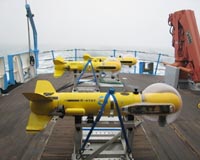 |
Washington (UPI) Jul 21, 2009 New rules proposed by the European Commission are the first step to avoid the disruption in gas supplies caused by last January's dispute on pricing between Russia and Ukraine. But they may be too late to meet a new crisis. When Gazprom, with the Kremlin's backing, tried to muscle Ukraine by cutting off supplies, Europe was hard hit. The flow of gas was reduced into Europe by 20 percent. Bulgaria and other EU member countries in the east saw the shutdown of schools and factories and households left without heat for two weeks. The crisis revealed the complete unpreparedness of the European Union as countries scrambled to respond, often at cross purposes. The new rules will enable the EU to "speak with one voice and act as one entity," said Energy Commissioner Andris Piebalgs. "We have known for some time that the existing arrangements to deal with gas emergencies are insufficient. The Russia-Ukraine gas dispute in January 2009 confirmed our fears. All member states recognize that we need common standards for security of gas supply for the whole EU," he continued. Commission President Jose Barroso said, "Increasing energy security will be one of the top priorities in the coming years. We need to work for the best but make sure we are prepared for the worst. Europe must learn the lessons of previous crises and make sure that European citizens are never again left in the cold through no fault of their own." Whether the rules proposed last week will be in time to meet a new crisis is uncertain. They must be approved by the European Council and European Parliament, a process expected to take several months. Meanwhile another payment dispute between Russia and Ukraine may be brewing. Piebalgs warned that another crisis could arise even as early as next month. Under the rules member countries have until March 2014 to develop gas storage capacity or alternate supplies sufficient to meet a 60-day interruption during winter of their primary gas supply. Each country has to designate a body responsible for gas supply security to develop the plan. The commission could declare an EU gas emergency at the request of a member state or if the EU loses more than 10 percent of its daily gas imports. The EU executive would have the power to coordinate the actions of member states in such an emergency. The existing Gas Coordination Group would have greater powers to ensure the swift collection and sharing of all relevant data. The EU is heavily dependent on oil and gas imports for its energy. Gas supplies 25 percent of its energy needs, and more than half of it is imported. By 2020 the EU will be importing 80 percent of its gas. Fifteen of the 27 member states already import almost all of their gas. Forty-two percent of EU gas imports come from Russia, which is the largest single provider. Norway is second at 24 percent. The eight former Warsaw Pact countries now in the EU rely on Russia for 77 percent of their gas imports, which is why they were hit especially hard by the dispute last winter. Share This Article With Planet Earth
Related Links Powering The World in the 21st Century at Energy-Daily.com
 Gulf states mull underwater defenses
Gulf states mull underwater defenses Abu Dhabi, UAE (UPI) Jul 21, 2009 The navies of the six Gulf Cooperation Council states are increasingly focusing on bolstering their underwater defenses against possible attack by Iranian sabotage teams. The main purpose of underwater defenses for these countries -- Saudi Arabia, the United Arab Emirates, Kuwait, Qatar, Oman and Bahrain -- is to protect vulnerable oil and gas facilities offshore and coastal terminals ... read more |
|
| The content herein, unless otherwise known to be public domain, are Copyright 1995-2009 - SpaceDaily. AFP and UPI Wire Stories are copyright Agence France-Presse and United Press International. ESA Portal Reports are copyright European Space Agency. All NASA sourced material is public domain. Additional copyrights may apply in whole or part to other bona fide parties. Advertising does not imply endorsement,agreement or approval of any opinions, statements or information provided by SpaceDaily on any Web page published or hosted by SpaceDaily. Privacy Statement |